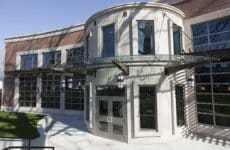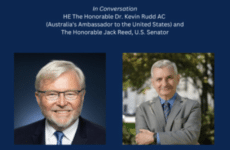By: Jessica Pezzone
Posted In: Opinion

Photo credit: SALVEtoday
Activist Tim Wise, who spoke at Salve on Nov. 9 about racial privilege and Hurricane Katrina.
On Nov. 9, Tim Wise, noted as one of the most prominent anti-racist writers and activists in the United States, presented a lecture entitled “Race, Class, and Hurricane Katrina” in the Bazarsky Lecture Hall.
Attended by many members of the University and the Newport community, Wise’s hour-long talk addressed racial issues, white privilege throughout New Orleans and the influence of big business and the media on our society today. Wise, a powerful speaker who quite thoroughly researched his ideas, had an effect on all who heard him speak or read his literature. Wise, who spoke on the issue of racial privilege in reference to Hurricane Katrina, noted the racial makeup of New Orleans: an urban society, dominated by black people, and immensely poorer than the majority of the country. New Orleans is extremely racially segregated, and Wise noted that the disparities between the minority communities and affluent white communities were “sickening.” According to the Greater New Orleans Community Data Center, neighborhoods such as New Orleans’ direly underprivileged Fischer Development are 99.2 percent black, while the extremely wealthy Lake Shore/Lake Vista community is a mere 6 percent African American. Wise claims that racial and economic problems began long before Hurricane Katrina, and that the big businesses crippling these poorer communities were sure to lead to eventual disaster. The government had no plan to evacuate the underprivileged residents of New Orleans out of the community, but instead set up emergency shelters in the Convention Center and the Superdome. These refuges were not equipped with the necessary supplies to accommodate the large number of citizens with deaths being reported due to a lack of food, water, and medicine. Although there was television coverage of people begging for these life-saving items, necessary aid was not sent for days after the tragedy occurred. One of Wise’s points of outrage was the response of the government to the hurricane relief efforts even after the storm had hit. On his website (www.timwise.org), Wise said, “Congress took four days to come back from their vacation to arrange for an emergency aid bill. [Congress] couldn’t manage to hustle it back to D.C. for four days to help save the dying in New Orleans.people who. are mostly poor and mostly black.” Wise was further angered by the fact that Congress had only allocated $10 billion to relief efforts – a small sum, he claims, when used against the backdrop of the Iraq war. Throughout his speech, he noted that people should not be surprised by the government’s slow response to the tragedy. He said that this is the path that our nation’s politics has always followed – taking care of constituents that can make personal contributions to their campaigns first, and pushing for the sake of people of color and the disadvantaged only when absolutely necessary. Wise notes that America is an extremely individualistic society and faults our “winner-take-all” mindset for many of the problems that beset those who are disadvantaged today. Wise said Americans, especially white Americans, look out only for themselves and those people similar to them and think that there must be something wrong with others when they cannot achieve to the same standards. Our individualistic mentality allows us to minimize and dehumanize the problems of others (“Well maybe if he worked a little harder, he would have a car and be able to get out of New Orleans!”), instead of looking out for our fellow citizens when they are besieged by tragedy. He points to the category-five storm, Hurricane Ivan, which hit Cuba in March of 2004 and notes that, although most of the country is poor and plagued by internal troubles, there wasn’t a single person killed in the storm. Wise notes that if Americans had a basic level of respect and equality for all people, that many of the problems minorities face would be obliterated. Some of the most interesting portions of Wise’s speech were his thoughts on the media at large. Wise had very specific examples to prove that African Americans were very unfairly portrayed in the images that surfaced after Hurricane Katrina, and he claims that he is disgusted by the level to which the media does not research their own “facts.” He claims the media to be almost purely sensationalist, with no real affinity for the truth or compassion for the problems of others. If you watched the news at all during the Hurricane Katrina coverage, you most likely saw the images of black people looting big screen televisions from stores in downtown New Orleans. The media claimed that this looting was so “widespread,” yet Wise claims that there were only a handful of images that actually were shown on television – if there was so much looting going on, then why do reporters only have five pictures of it? As for people stealing food, medicine, and clothing, it is disgusting that the media and those outside Louisiana could fault citizens for taking the basic survival items that they needed (and were certainly not provided by the state or national government!) – any parent would no less die for their child then take a few bottles of water that were absolutely necessary for survival. It stuns Wise that reporters simply never asked for any of the stories behind this looting – if they had paid any attention at all, the media may have noticed that you can’t plug big screen TVs in during a hurricane, and that New Orleans residents were using these objects as barter items to make their way out of the city. Stealing is definitely a crime, but when people are looting for basic survival and a path out of Katrina’s life-threatening hell, then shame on us for looking down upon them as dirty criminals. Wise also notes the extremely evident racial bias that came with images of the hurricane. He noted during his speech that there were a series of photos of looters that had surfaced, ones which clearly discredited blacks for stealing and made no mention of white looting of stores. “Photos widely circulated on Yahoo.com with captions yesterday, presented an image of a black man with a garbage bag full of God knows what, side by side with a picture of two white folks wading through waist-deep water with bags of food in their hands: the captions? The black man, according to the news, had “just looted” a store. The white man and woman had “found” food from a flooded store. White people find things. Black people steal things. Got it?” (Wise, www.timwise.org). Subconscious or not, the media clearly discriminated against people of color throughout the hurricane coverage, whether through categorizing them as “bums” who couldn’t get out of the city, or faulting them for taking basic survival items for their families. There were many follow-up questions to Wise’s lecture, mostly students interested in how they could become involved in his cause or how they could combat this racism in their everyday lives. Many of the people who attended Wise’s talk noted how stunned they were that they hadn’t previously noticed many of the things he had said – because his analysis is so driven by facts, it is easy for one to be captivated by his ideas and message. The response to Tim Wise on the Salve Regina campus is definitely a positive one, and people are spreading the word by sharing many of the facts that they learned during his discourse. If you would like more information on Tim Wise and his thoughts on Hurricane Katrina, simply visit www.timwise.org. Wise is the author of “White Like Me: Reflections on Race from a Privileged Son” and “Affirmative Action: Racial Preference in Black and White.”













